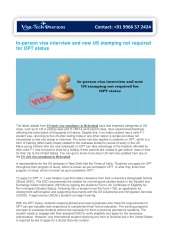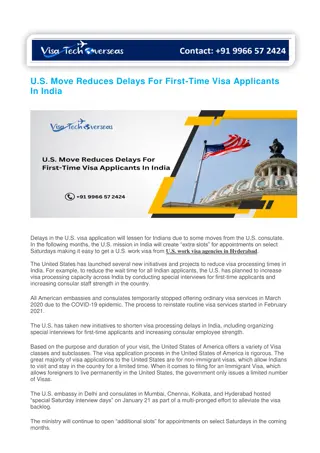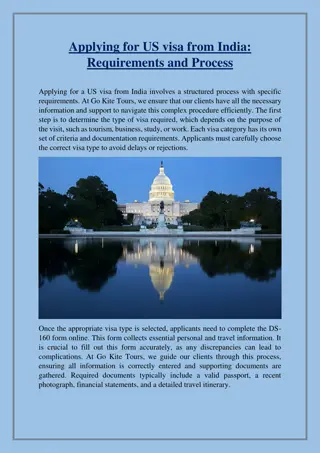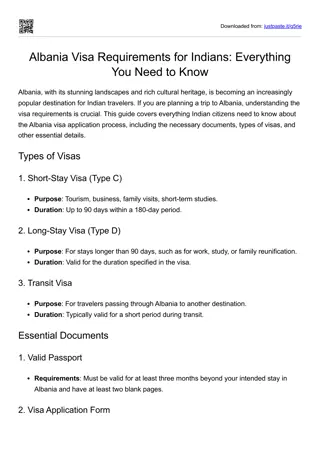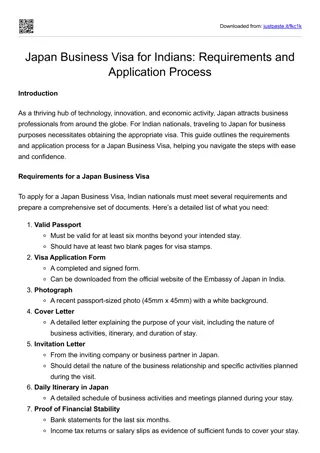Understanding U Visa Certification Law Training for Certifiers
U Visa Certification Law Training for Certifiers is essential to encourage victims to report crimes and contribute to investigations and prosecutions. This certification process aims to help victims of qualifying crimes in the U.S. who have suffered abuse and have information crucial for law enforcement. Immigrants who receive U visa status may eventually apply for permanent residency. Required documents for Form I-918 include evidence of victimization and personal statements. The U visa timing indicates a significant wait time due to USCIS limitations on granting nonimmigrant status. Certifiers can provide certification at various stages of the criminal justice process.
Download Presentation

Please find below an Image/Link to download the presentation.
The content on the website is provided AS IS for your information and personal use only. It may not be sold, licensed, or shared on other websites without obtaining consent from the author. Download presentation by click this link. If you encounter any issues during the download, it is possible that the publisher has removed the file from their server.
E N D
Presentation Transcript
U Visa Certification Law TRAINING FOR CERTIFIERS
U Visa Basics Encourage victims to report crimes and contribute to investigations and prosecutions Victims of Trafficking and Violence Prevention Act of 2000 Congress also sought to encourage law enforcement officials to serve immigrant crime victims and build relationships
U Visa Basics Continued Who Qualifies Victims (indirect or direct) of certain qualifying crimes in the U.S.; Who suffered substantial physical or mental abuse; Who have information about the crime, and who were helpful, are helpful, or are likely to be helpful to law enforcement in the investigation and prosecution of said crime.
What do immigrants receive 4 years of U visa status Immigrants who receive U visa status, may apply for permanent residency after their third year if the immigrant s continued presence is justified on humanitarian grounds, to ensure family unity, or is otherwise in the public interest.
Documents Required for Form I-918, Petition for U Nonimmigrant Status Form I-918, Supplement B, U Nonimmigrant Status Certification (Without this, the I-918 cannot even be submitted to USCIS) Evidence that immigrant was victim of qualifying criminal activity Evidence of physical or mental abuse Personal statement
U Visa Timing Per Congress, USCIS can only grant U nonimmigrant status to 10,000 principal applicants a year. According to USCIS s 2020 report on immigration applications made by victims of crime, those placed on the waiting list in FY 2020 waited 47.9 months before being placed there. As of September 30, 2021, there were 170,212 pending principal applicant petitions. There is an additional 10 month wait from waiting list to final adjudication which puts the wait time at 58 months nearly 5 years.
I-918, Supplement B, Nonimmigrant Status Certification Can certify at any time: for police, before or after a suspect is apprehended, if a suspect is never apprehended but the crime is reported; for State s Attorney s Offices can certify before or after prosecution, while case is pending, or even if there is no prosecution due to evidentiary or other circumstances. There is no statute of limitations on signing certifications (Vermont Service Center, the office of USCIS that processes these types of cases has specifically stated that they have processed cases with crimes that happened back in the 70s).
Helpfulness No degree of helpfulness required. The victim must not unreasonably refuse to provide help that is reasonably requested. Totality of the circumstances test Oftentimes, the victim s ongoing cooperation may jeopardize the victim s safety or the safety of family members in the U.S. or abroad. The nature of the victimization, victim s fear of the abuser/persecutor, trauma suffered (both mental as well as physical), use of force, fraud, and coercion from others in the case, and any ongoing abuse should be taken into consideration. Age and disabilities should also be taken into consideration Immigrants often do not have regular employment and do not have the luxury to take time off continuously without being fired.
Long wait times in certain jurisdictions; Certifiers requiring a case to still be ongoing; Need for Law Certifiers requiring a case to be closed; Certifiers not wanting to sign if the case happened over x number of years (varying by jurisdiction); Denials even when immigrant was clearly helpful.
U Visa Certification Law Checklist Helpfulness Confidentiality Clause A presumption that the victim has been helpful, is helpful, or is likely to be helpful. A clause that only allows certifiers to disclose information on the victim in order to comply with federal law, court order, or a discovery obligation in the prosecution of a criminal offense. Turnaround Time Days that it will take for certifier to respond upon receiving the request. Tracking There should also be an expedited turnaround time for those in removal proceedings or with family members who may age out. The number of certification requests should be tracked by the certifiers, along with the number of approvals and denials. Recertification This data should be reviewed annually by someone like the State s Attorney General or the legislature. A clause that should allow for recertification should it be needed, and that also has a turnaround time. Training and Communication with Community-Based Organizations (CBOs) Follow up Requests Certifiers should have regular training to ensure their U Visa certification process/policy is understood. Such training should be done with CBOs to ensure it is responsive to community needs. Victims and their representatives should be informed of the reasons behind any denial and should be given the opportunity to respond with the appropriate evidence. Documents Accountability Give victim copies of any documents in the possession of the certifying official that shows the harm endured by the victim due to the criminal activity. Ways that victim or representative can seek redress if the certifier refuses to certify, and it is believed it should have been. It is important for a court to be able to review these denials and ensure certification occurs for victims who qualify.
Ramifications of Not Signing Certifications IMMIGRANT VICTIMS NOT PROTECTED THIS GOES AGAINST CONGRESSIONAL INTENT OF PROTECTING IMMIGRANT VICTIMS FAMILY SEPARATION LACK OF TRUST IMMIGRANTS BECOME/REMAIN WARY OF REPORTING CRIMES; VICTIMS OF SEVERE CRIME MAY NOT BE ABLE TO REMAIN IN THE U.S. OFTENTIMES BEING SEPARATED FROM LOVED ONES FEAR EXISTS THAT LAW ENFORCEMENT MAY TURN THEM INTO IMMIGRATION; THESE IMMIGRANTS COULD BE DEPORTED SOMEONE WHO PREVIOUSLY REPORTED, MAY NOT REPORT AGAIN
Steps for Successful U Visa Certification Have a process/policy; Ensure that process does not exclude others based on the year the crime took place; Post the process online where it is easily accessible to the public (preferably in other languages where possible); Ensure there is a designated certifier(s) and that the rest of agency knows about certification; Collaborate with Community Based Organizations (CBOs) to ensure process/policy takes needs of community into account; Reach out to CBOs for training on the U visa and certification.
Steps for Successful U Visa Certification Continued Track denials & approvals in an internal log; Write down reasons for denials; Inform victim or their representative as to the reason for the denial; Ensure policy is compliant with state law; Be sure to certify or deny within the specified time; If there is a delay in certification, be sure to communicate with Requestor to ensure immigrant will not be adversely impacted by this delay.










